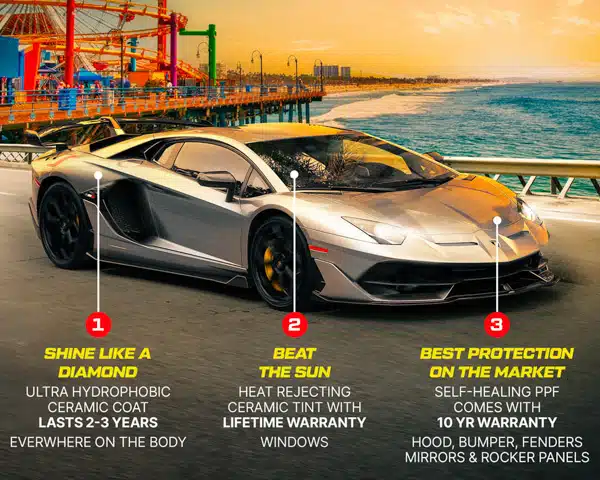Will PPF protect from the Sun?
We’ve all seen Damaged Paint on vehicles. UV rays not only cause paint to fade but can also lead to more serious damage, such as cracking and peeling, over time. While many car enthusiasts turn to waxing or covering their vehicles, Paint Protection Film (PPF) is becoming the #1 choice for long-lasting defense. Known primarily for shielding against physical abrasions, PPF also provides significant UV-blocking benefits. But how effective is it at protecting your car from sun damage? This post dives into the UV-blocking properties of PPF, its application on both paint and headlights, and how it compares to other methods of sun protection.
How Does Paint Protection Film (PPF) Protect Against Sun Damage?
PPF acts as a physical barrier between your car’s paint and the harmful UV rays that can cause fading, discoloration, and other sun-induced damage. Paint Protection Film is specifically engineered to block UV rays and withstand environmental wear. This UV-resistant technology prevents paint from degrading over time, ensuring your car maintains its showroom finish even under intense sunlight.How Long Does Paint Protection Film (PPF) Last in the Sun?
Paint Protection Film (PPF) is designed to last between 5 to 10 years or more, even in sunlight, depending on factors like the quality of the film, professional installation, maintenance, and environmental conditions. Premium brands like XPEL offer better durability and UV resistance, while proper installation maximizes adhesion and coverage. Regular cleaning and care help maintain the film’s integrity, and adding a ceramic coating on top can enhance protection against UV rays and contaminants, further extending its lifespan. In fact, Ghost Shield Film PPF is backed by a 10-year warranty that covers yellowing and cracking due to sun exposure. This warranty, combined with the durability of XPEL products, provides peace of mind for car owners who want their paint protected, even in harsh sunlight. However, the longevity of PPF can be extended further with regular care and maintenance, as well as the optional addition of a ceramic coating.Does Paint Protection Film (PPF) Go Over Headlights?
Yes, Paint Protection Film (PPF) can be applied over headlights to protect them from yellowing and UV damage, extending the lifespan and clarity of the lights. PPF acts as a barrier against discoloration and scratches, so the headlights stay bright and clear. For more details on protecting your headlights with PPF, check out our blog: PPF on Headlights: Is It Worth It?Does Clear Coat Protect Against UV Rays?
Yes, the factory-applied clear coat does offer some level of UV protection. However, this fades over time, leaving the paint vulnerable to sun damage, leading to fading, cracking, and chipping. PPF provides an extra layer of protection on top of the clear coat, ensuring the original paint is better protected over the years.What’s the Best Product to Protect Your Car from the Sun?
For maximum protection, Paint Protection Film, installed by Ghost Shield Film, is the top choice. XPEL’s reputation in the industry stems from its advanced technology, providing UV-blocking, anti-yellowing, and scratch-resistant properties. When combined with a ceramic coating, PPF is simply the most durable, effective solution for protecting your vehicle against sun damage.Protecting Your Car Paint from the Sun: Key Methods
- Professional PPF Installation: Ensure flawless application and maximum UV protection by having PPF installed by experts like Ghost Shield Film.
- Ceramic Coating Enhancement: Apply a ceramic coating over PPF for added durability and a long-lasting glossy finish.
- Regular Maintenance: Wash and occasionally wax your vehicle to maintain the effectiveness of PPF.
- Parking in Shade: Reduce direct sun exposure, especially if you don’t have PPF or ceramic coating.
- Invest in PPF: Offers continuous protection, even when your car is regularly parked outdoors.
- UV-Resistant Car Cover: Use a cover to reduce surface temperatures and help prevent sun damage when parking in direct sunlight.
- Regular Washing and Maintenance: Keep contaminants off the surface to minimize the effects of sun exposure.

